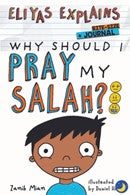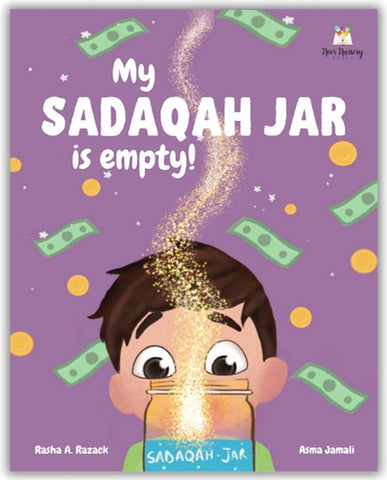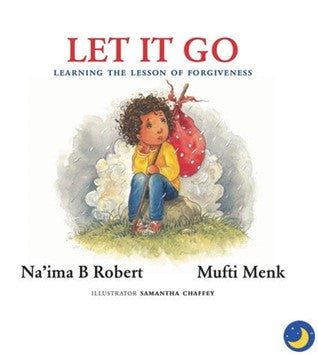Ever wonder what a foolproof plan to get into heaven looks like? Read on because this week Crescent Moon Bookstore presents a comprehensive bucket list to get into eternal Jannah!
As we write this blog, our Palestinian brothers and sisters are suffering unimaginably at the hands of the occupying Israeli forces. Please consider donating to the Palestinian Children's Relief Fund, a credible organization providing relief and assistance in the region. If you are looking for books that talk to kids about Palestine, here is our latest book listing that celebrates Palestinian stories and authors.
As we continue to watch the horror continuing in Gaza with helplessness, one thing has become apparent for many Muslim families. This dunya, (world) is not the destination. We are here for a reason, a task, a trial. We are not to attach our hearts to the flimsiness of this world. Just like the martyrs of Gaza, soon it’ll be our time.
And when it does, where are we headed to next?
To Jannah, Inshallah. At least, that is what we wish and pray for. But what else can we do to ensure we maximize our chances of pardon from Allah SWT and a swift entry into Paradise?
We pray, we fast, we do charity..what else?
To simplify things, Crescent Moon Bookstore has created a bucket list for Jannah. Let’s carry this bucket list with us as we move through 2024, regularly striking off each one until it becomes a way of life that takes us to Jannah by Allah’s SWT will.
But first, what is Jannah, and why are we trying to get there?
Allah SWT promises Jannah or paradise to the true believers as a reward for all the hardships they endured during their lives.
Allah SWT says,
“There they will have whatever they wish, and with Us is more.” (Quran 50:35)
And,
“And no soul knows what is hidden for them, of joy as a reward for what they used to do. (Quran 32:17)
Now that we got that cleared out let’s get straight to our Jannah Bucketlist for 2024!
The 2024 Jannah Bucket List for Young Muslims
Check Your Niyyah (Intention) Before All Else
Have you got your New Year's resolutions in place? If not, head to our blog to learn how to set realistic and Islam-oriented New Year resolutions. Many of us may have a long list of goals and aims to work on, but before we begin, we must set our intentions in a way pleasing to Allah SWT.
What is intention-setting, you ask?
Setting an intention means to think out a plan of action mindfully. Making a Niyyah or intention-setting drives us to attain our goals. Making a niyyah holds a very high place in Islam. The Prophet Muhammad PBUH said,
“Actions are according to intention, and everyone will get what they intended.” (Bukhari and Muslim)
As Muslims, we make the intention to pray for Allah’s SWT pleasure five times a day. We intend to fast during Ramadan for the sake of Allah SWT. Similarly, we must ensure that the proper intention backs all our good deeds. By setting a pure intention before doing any task, we stand to maximize the rewards we can reap from that very action and, in return, attain Jannah.
To check mindful intention-making off your Jannah bucket list, follow the following steps:
- Before you do anything, seek the pleasure and mercy of Allah SWT.
- Think about why you are doing this task. Does it bring you closer to Allah SWT?
- Does it increase your faith?
- Does it include an act of service that will please Allah SWT?
- To teach the values of niyyah to kids, we recommend Zak and His Good Intentions. You can find it here.
Praying Salah with Connection and Khushu'
If we lose Salah, we lose everything. The five daily prayers are the most important pillar of Islam, second only to the verbal proclamation of faith. To get to Paradise, you must tick this box off your Jannah bucket list.
And while praying, it is equally important to be in a state of mindfulness and close connection with Allah SWT. Having khushu’ in your Salah means being mindfully present, concentrating on the prayer, and realizing that you’re speaking to Allah SWT.
To improve your focus during Salah, try the following steps:
- Listen to what you recite and internalize its meanings.
- Truly sense and experience your recitations.
- Make sure you recite the Surahs correctly with Tajweed.
- Pray in congregation, as a family or in the mosque
If you want to teach your children about mindfulness in Salah, we highly recommend Eliyas Explains: Why Should I Pray My Salah?
Make the Quran your Best Friend
You cannot achieve the khushu’ mentioned above in Salah if you don't have a relation with the Quran. This year, your Jannah bucket list must feature the Quran.
Start with learning how to recite the Quran with Tajweed. Knowing how each letter is pronounced makes it easy to eliminate errors in your recitation. The Holy Quran with color-coded Tajweed rules is a great resource for studying the Tajweed.
Next, move on to understanding the meaning behind the words. Read the Quran with translations and tafseer to know what the verses are trying to tell you. Memorize the small Surahs and move on to the longer ones.
The more we connect with the Word of Allah SWT, the more we open our hearts to His presence. Encourage your family to revise the Quran with you. Here is a very beneficial blog for parents whose children memorize the Quran.
Humble Yourself and Be Kind
If one characteristic will take you to Jannah, it's humility. The Prophet Muhammad PBUH said,
“None shall enter paradise who holds in his heart the weight of a mustard seed of pride” (Muslim)
To be truly humble, we must understand the difference between being grateful and feeling superior to others. It is perfectly fine for a person to feel like Allah has blessed them immensely. But the moment it feels like we deserve these blessings more than others, we start to tread dangerous territories of arrogance.
You can cross this box off your Jannah bucket list by trying the following:
- Monitor your heart: While we are not called to account for our thoughts and feelings, we must check them as they are usually the focal point of our actions. Seek the forgiveness of Allah SWT when you feel pride, ego, or superiority over others.
- Increase private acts of worship: To gain humility and counteract arrogance, spend time worshipping Allah SWT in seclusion. Praying Tahhajud and fasting are excellent ways to practice humility.
Give Generously to Those in Need
Humility and charity are closely connected in Islam. Involving ourselves in the lives of the less fortunate evokes humility in us, and the act of charity and Sadaqah towards the deserving results directly from it.
The rights of the poor are protected in Islam through Zakat, which comes from the excess of the wealth Allah SWT bestows us with, but it is the sweetness of the voluntary acts of generosity that brings us close to attaining Paradise.
Kids can learn more about Sadaqah and Zakat from My Sadaqah Jar is Empty and Ilyas and Duck: A Zakat Tale.
You can check Sadaqah off your gender bucket list by regularly doing the following:
- Volunteering your time and efforts for a good cause
- Sharing the knowledge of Islam
- Inspiring others to be better Muslims
- Acts of service towards your family
- Sponsoring orphans and widows
- Smiling at a fellow human being
Stay Away from Habits that Reduce your Good Deeds
Sins and bad deeds diminish the connection that we have with Allah SWT and prevent our hearts from softening towards our faith. Sins also eat away at the reward that we gain from our good deeds. For example, gossiping about a fellow Muslim can cause their evil deeds to be transferred to us and our good deeds to go into their account.
If we yearn earnestly for Jannah, we must try our best to avoid sinning. Of course, no human is free from error, but we continue to turn to Allah for forgiveness because He is the Lord of infinite mercy. To check off this criterion from your Jannah bucket list, try the following:
- Be on your best behavior with your family and loved ones.
- Unfollow social media pages that cause you to sin
- Recognize your character flaws and work towards improving them
- Be devoted to your prayer, Quran recitation, charity, and fasts, as these are some good deeds that erase the bad ones.
- Forgive often, as when a Muslim forgives others, Allah SWT forgives them. Let it Go by Naima B Robert is an excellent book that teaches forgiveness and generosity to children. You can buy it here.
Make Sincere Dua
Many of us find that when we begin to come closer to our faith, we must battle several opposing energies. Sometimes, it is our Nafs (self), or the whispers of Shaytan, or even a busy routine that hinders our progress. At such times, we must use potent tools like dua and adhkar to protect us from straying away from our path.
The Prophet Muhammad PBUH said,
“Let one of you ask your Lord for every need, even until he asks Him for the strap of his shoe when it breaks.” (At-Tirmidhi)
Make it a daily practice to recite the morning and evening adhkar and make dua after every prayer. There are certain times when duas are especially answered. These are:
- When it rains
- During an eclipse
- Right after the Adhan
- During the Salah in prostration
- The last portion of the night-time just before Fajr
Remember not to miss these special moments to make dua! We highly recommend Prayers of the Pious and 365 Duas with Stories to learn more about the virtues of remembrances of Allah SWT.
While we can put our honest efforts to tick all the boxes on our Jannah bucket list, it is ultimately up to Allah SWT to guide and inspire us. What are some routines you follow to seek Jannah? Drop a comment and let us know!






